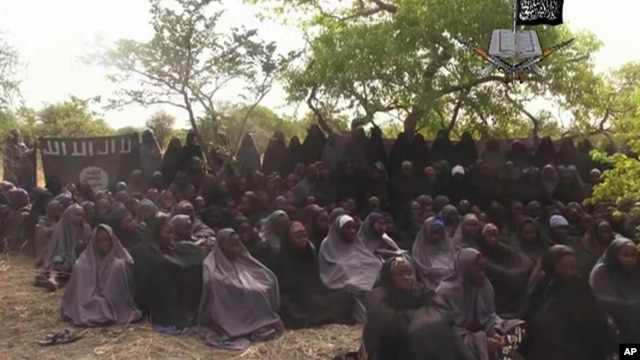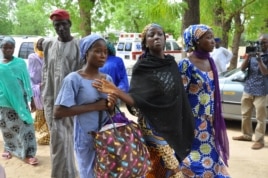Nigeria's
Boko Haram terrorist network, shows the alleged missing girls abducted
from the northeastern town of Chibok.
Militant group Boko Haram and the Nigerian government have reached a cease-fire agreement that calls for the release of more than 200 girls the militants kidnapped from the town of Chibok in April.
The two sides reached the agreement Friday at talks in Saudi Arabia that involved Chadian President Idriss Deby and high-level officials from Cameroon.
Hassan Tukur, a close adviser to Nigerian President Goodluck Jonathan, and Danladi Ahmadu, who calls himself the secretary-general of Boko Haram, have told VOA's Hausa-language service that the girls are to be released Monday in Chad.
On April 14, dozens of Boko Haram fighters stormed a secondary school in Chibok, kidnapping around 270 girls. Fifty-seven managed to escape.
The two sides reached the agreement Friday at talks in Saudi Arabia that involved Chadian President Idriss Deby and high-level officials from Cameroon.
Hassan Tukur, a close adviser to Nigerian President Goodluck Jonathan, and Danladi Ahmadu, who calls himself the secretary-general of Boko Haram, have told VOA's Hausa-language service that the girls are to be released Monday in Chad.
On April 14, dozens of Boko Haram fighters stormed a secondary school in Chibok, kidnapping around 270 girls. Fifty-seven managed to escape.
Ahmadu said the other girls are alive and "in good condition and unharmed."
The sources say the girls will be handed over to Chadian President Deby for transfer to Nigerian authorities. They also say Nigerian and Boko Haram delegates will meet in the Chadian capital, N'Djamena, to discuss Boko Haram's demands, such as the release of imprisoned militants.
Earlier, Nigeria's chief of defense staff, General Alex Badeh, issued an order to all military chiefs, telling them "to comply with the cease-fire agreement between Nigeria and Boko Haram in all theaters of operations."
The cease-fire marks a possible end a five-year insurgency in which several thousand Nigerians have been killed.
Nigerian leader criticized
Nigerian President Jonathan has been criticized at home and abroad for the inability of Nigerian troops to quell the violence by the militants, seen as the biggest security threat to Africa's top economy and leading energy producer.
Criticism intensified in mid-April, when dozens of Boko Haram fighters stormed a secondary school in the remote northeastern village of Chibok, kidnapping around 270 girls. Fifty-seven managed to escape.
In a video, the Boko Haram leader known as Abubakar Shekau threatened to sell the remainder as slave brides, vowing they would not be released until militant prisoners were freed from jail.
Boko Haram has said it is fighting to establish an Islamic state in Muslim-majority northern Nigeria.
The group has launched scores of attacks in the past five years, targeting markets, bus stations, government facilities, churches and even mosques. Militants recently took over some towns in the northeast for what Shekau said in another video would be an Islamic caliphate.
The Nigerian military says that Shekau was actually an impostor and that the real Shekau was killed several years ago. It says the impostor was killed last month during a battle in the town of Konduga.


No comments:
Post a Comment